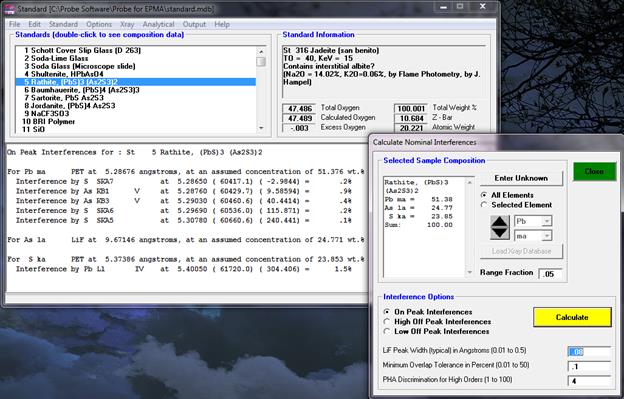Interferences
This command will accept a composition (of either a standard number in the standard database or an unknown composition entered by the user) and calculate the approximate percent spectral interference overlap on all interfered lines based on the concentrations, the x-ray line intensities of all known lines, a user defined Gaussian peak width, and a PHA discrimination factor for higher order lines.

The percent interference intensity is based on the actual concentrations of both the interfered and interfering elements. For example, if the concentration of the interfered element is stated as 5.3 wt. % and the percent interference is calculated to be 10%, then the apparent concentration that might be measured is 10% greater than the actual concentration, or 5.3 plus 0.53 (that is, 10% of 5.3) which equals 5.83 wt. %. Note that since this is only a nominal calculation, it should only be used as an indicator of possible problematic analytical situations.
The interference calculation uses the x-ray line and crystal defaults as defined in the ELEMENTS.DAT file (usually found in C: \ProgramData\Probe Software\Probe for EPMA). A sample interference output for a biotite standard is shown here :
*******************************************************************************
STD 112 biotite #3 MZbar= 10.688 Zbar= 13.413
LMNT: SiO2 Al2O3 FeO MgO CaO Na2O K2O TiO2
OXWT: 38.620 10.720 18.130 14.010 .020 .690 9.210 2.290
ELWT: 18.052 5.674 14.093 8.448 .014 .512 7.646 1.373
K-FAC .1435 .0407 .1206 .0571 .0001 .0027 .0696 .0120
Z-COR 1.2583 1.3931 1.1688 1.4808 1.0749 1.9290 1.0987 1.1443
MPCT: 34.560 5.653 13.568 18.690 .019 .599 5.257 1.541
APCT: 11.520 2.261 6.784 9.345 .010 .399 3.505 .514
LMNT: MnO BaO Rb2O Cl F H2O
OXWT: .950 .110 .030 .020 4.020 2.660
ELWT: .736 .099 .027 .020 4.020 .298
K-FAC .0062 .0007 .0002 .0002 .0130 .0000
Z-COR 1.1881 1.3255 1.3704 1.1777 3.0936 .0000
MPCT: .720 .039 .009 .030 11.378 7.939
APCT: .360 .019 .006 .030 11.378 5.293
TOTAL WEIGHT PERCENT : 101.480 TOTAL OXYGEN FROM CATIONS : 40.469
AVERAGE ATOMIC WEIGHT : 21.844 AVERAGE MOLECULAR WEIGHT : 54.564
LiF peak width = .080 Angstroms
Overlap tolerance = .100 Percent
PHA discrimination factor = 4.000
For Si ka at 7.1262 38.62 wt.% :
For Al ka at 8.3401 10.72 wt.% :
For Fe ka at 1.9373 18.13 wt.% :
For Mg ka at 9.8900 14.01 wt.% :
For Ca ka at 3.3595 .02 wt.% :
Interference by K SKB^4 I at 3.4040 is 1.2 % overlap.
Interference by K SKB''' I at 3.4116 is .1 % overlap.
For Na ka at 11.9101 .69 wt.% :
For K ka at 3.7424 9.21 wt.% :
For Ti ka at 2.7497 2.29 wt.% :
Interference by Ba LA1 I at 2.7767 is .4 % overlap.
For Mn ka at 2.1031 .95 wt.% :
For Ba la at 2.7759 .11 wt.% :
Interference by Ti SKA3 I at 2.7324 is .1 % overlap.
Interference by Ti SKA3'' I at 2.7367 is .3 % overlap.
Interference by Ti SKA' I at 2.7399 is .5 % overlap.
Interference by Ti SKA'' I at 2.7464 is 1.8 % overlap.
Interference by Ti KA1 I at 2.7490 is 270.0 % overlap.
Interference by Ti KA1,2 I at 2.7502 is 486.0 % overlap.
Interference by Ti KA2 I at 2.7527 is 230.7 % overlap.
Interference by Rb KA1 III at 2.7771 is .4 % overlap.
Interference by Rb KA1,2 III at 2.7813 is .6 % overlap.
Interference by Rb KA2 III at 2.7897 is .1 % overlap.
For Rb la at 7.3183 .03 wt.% :
For Cl ka at 4.7288 .02 wt.% :
Interference by Ba LB2 II at 4.8092 is .2 % overlap.
For F ka at 18.3200 4.02 wt.% :
Interference by Fe LA2 I at 17.5860 is 1.0 % overlap.
Interference by Fe LA1 I at 17.5860 is 8.5 % overlap.
Interference by Mg SKB^7 II at 18.4091 is .1 % overlap.
Interference by Mn LB1 I at 19.1034 is .2 % overlap.
The default Gaussian peak width is just a nominal value, increasing the width will produce greater overlaps. The PHA discrimination factor can adjust the contribution from higher order lines. The default of 4.0 will divide the intensity of each subsequent order by 4, before calculating the percent overlap. This means that each higher order line will be only 1/4 or 25 % of the intensity of the previous order. To decrease the contribution of higher order lines, increase the PHA discrimination factor.
This calculation is for use only as a guideline and is not intended for use as a quantitative spectral interference correction. Probe for EPMA contains special algorithms to empirically determine the actual spectral interferences based on measured overlaps.
The dialog will use the composition of the currently selected standard as a default composition. See the section on Weight Percent Entry under the Options | Match menu for instructions on entering an arbitrary unknown composition for calculation of nominal interferences.